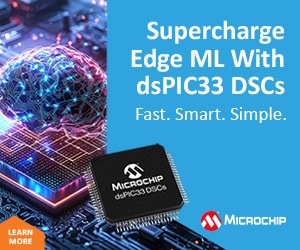This reference design is a fully functional unit that achieves over 90% efficiency and consumes less than 0.5W in standby mode.

Single-burner induction cooktops, available in both drop-in and portable models, are gaining popularity in homes, recreational vehicles, and restaurants due to their efficiency and compact design. Modern single-burner cooktops feature a low-profile design, high efficiency, and minimal standby power consumption, making them an ideal choice for a wide range of applications. To help system designers address design challenges and speed up product development, Microchip has introduced a highly cost-effective single-burner induction cooktop reference design. This reference design is a fully functional unit that achieves over 90% efficiency and consumes less than 0.5W in standby mode.
Microchip’s reference design incorporates advanced mTouch sensing solutions, allowing for precise functionality even through 4 mm of Schott Ceran ceramic glass. This design features a user-friendly interface with current settings prominently displayed via bright 7-segment displays, ensuring clear visibility. At the heart of this reference design is the PIC16F1619 8-bit PIC microcontroller. This microcontroller stands out due to its integration of Intelligent Analog features and Core Independent Peripherals (CIPs). These advanced components enable the microcontroller to efficiently manage critical tasks such as controlling a single insulated-gate bipolar transistor (IGBT) and the system fan. Additionally, it monitors the temperatures of both the IGBT and the cooking surface, ensuring optimal performance and safety.
The inclusion of CIPs significantly reduces the amount of code required for operation. This reduction in code not only streamlines the design process but also enhances the overall efficiency of the system, making it more reliable and easier to maintain. Furthermore, a separate PIC16F1939 PIC microcontroller is dedicated to handling the user interface. This separation of responsibilities between the two microcontrollers ensures that both the functional and user interaction aspects of the design are managed efficiently, contributing to a robust and user-friendly experience.
Key features of the reference design include a fully functional reference design with Core Independent Peripherals simplifying software requirements, a low-cost single IGBT quasi-resonant circuit, zero-voltage switching on a single IGBT, over 90% efficiency (compared to approximately 39.9% for gas and approximately 71.5% for electric), standby power consumption of 0.5W, maximum output power of 1800W at 220V, power input options of 110V or 220V at 50 Hz or 60 Hz, safety algorithms including pan detection and over-temperature protection, and dynamic fan control. It not only simplifies the development process for single-burner induction cooktops but also ensures high efficiency and reliability. With its advanced features and robust performance, this reference design is an ideal solution for designers creating innovative and efficient induction cooktops for various applications.
Microchip has thoroughly tested this reference design, ensuring its reliability and performance. The design package includes circuit schematics, Gerber files (board layout), a bill of materials, software, and technical documentation. Additional information about the reference design can be found on the company’s website. To read more about this reference design, click here.









